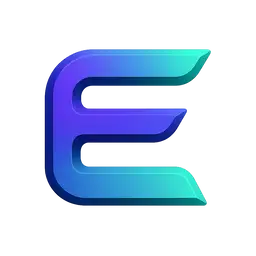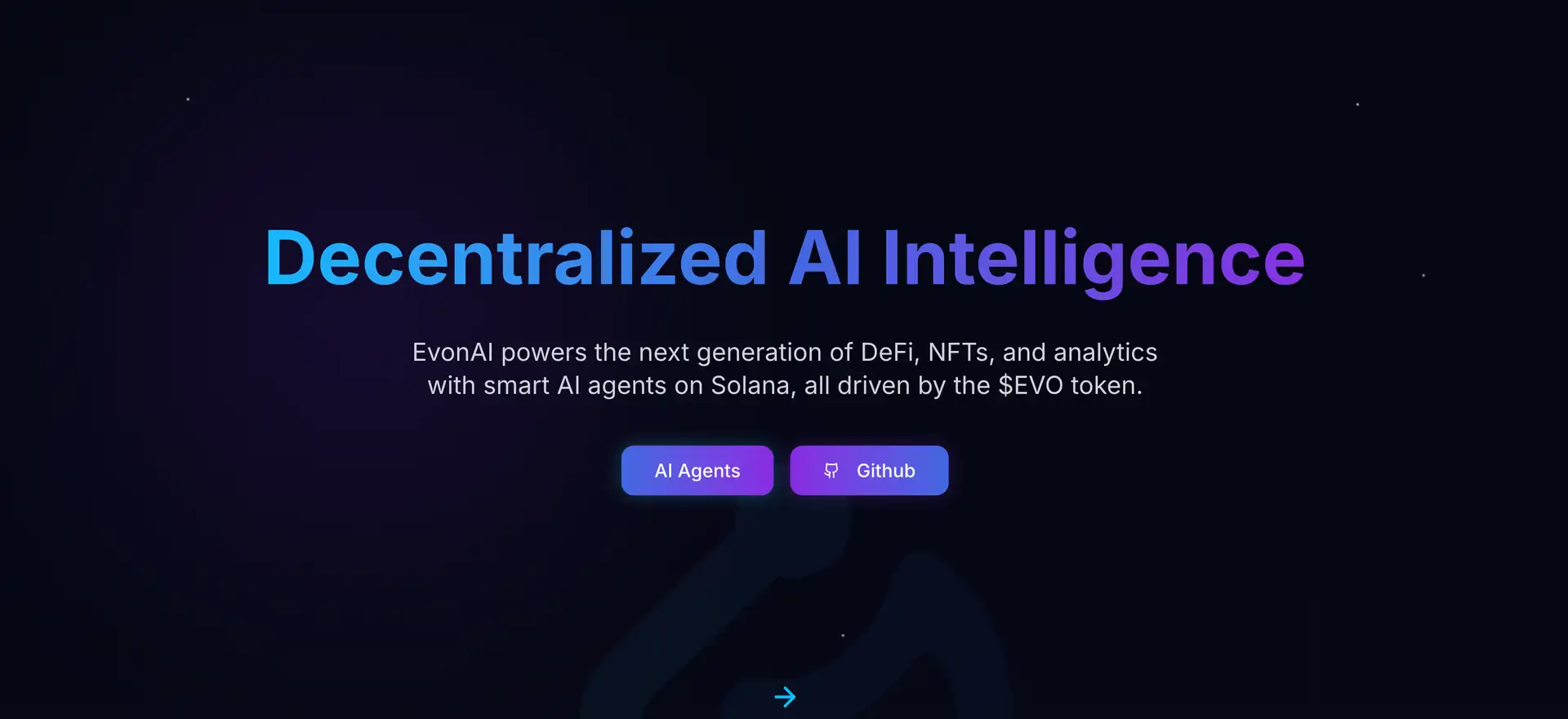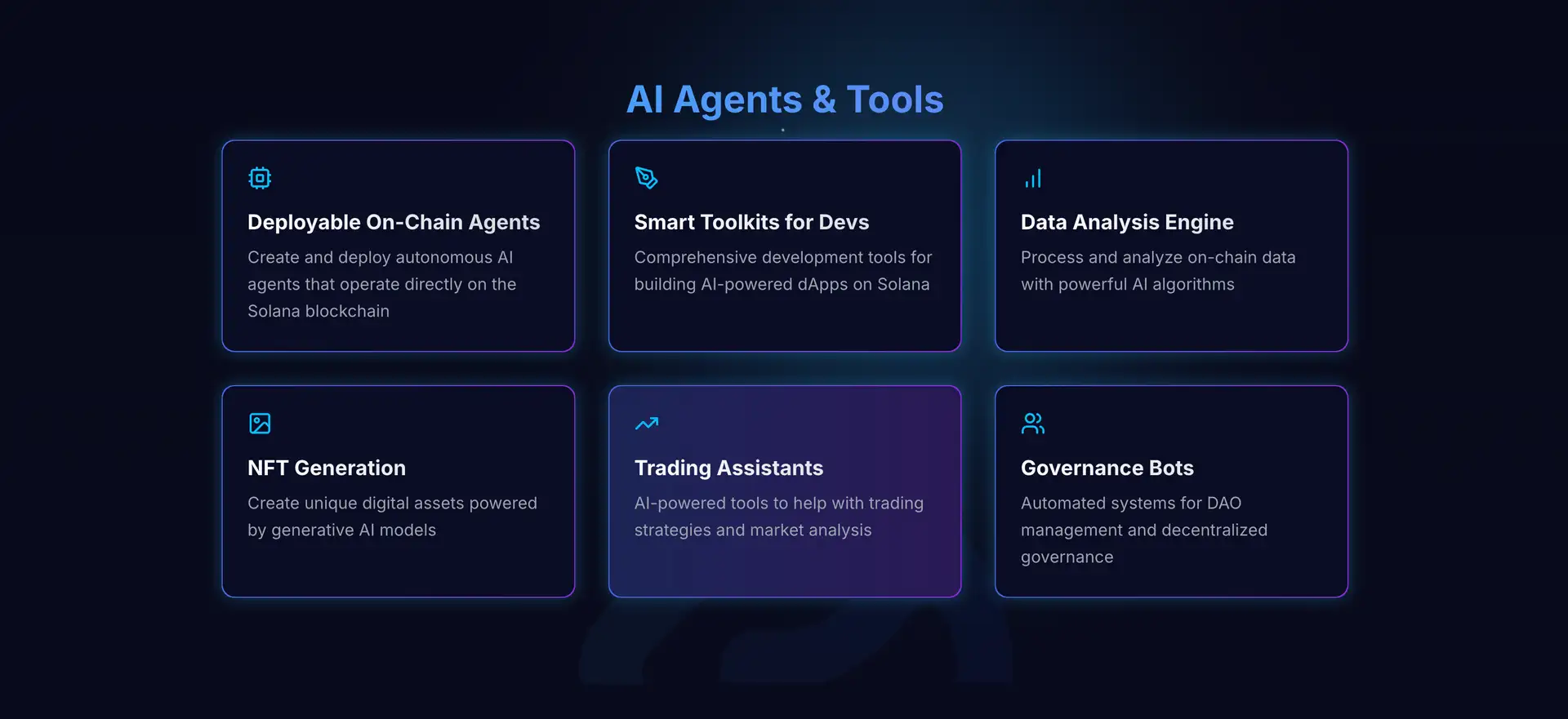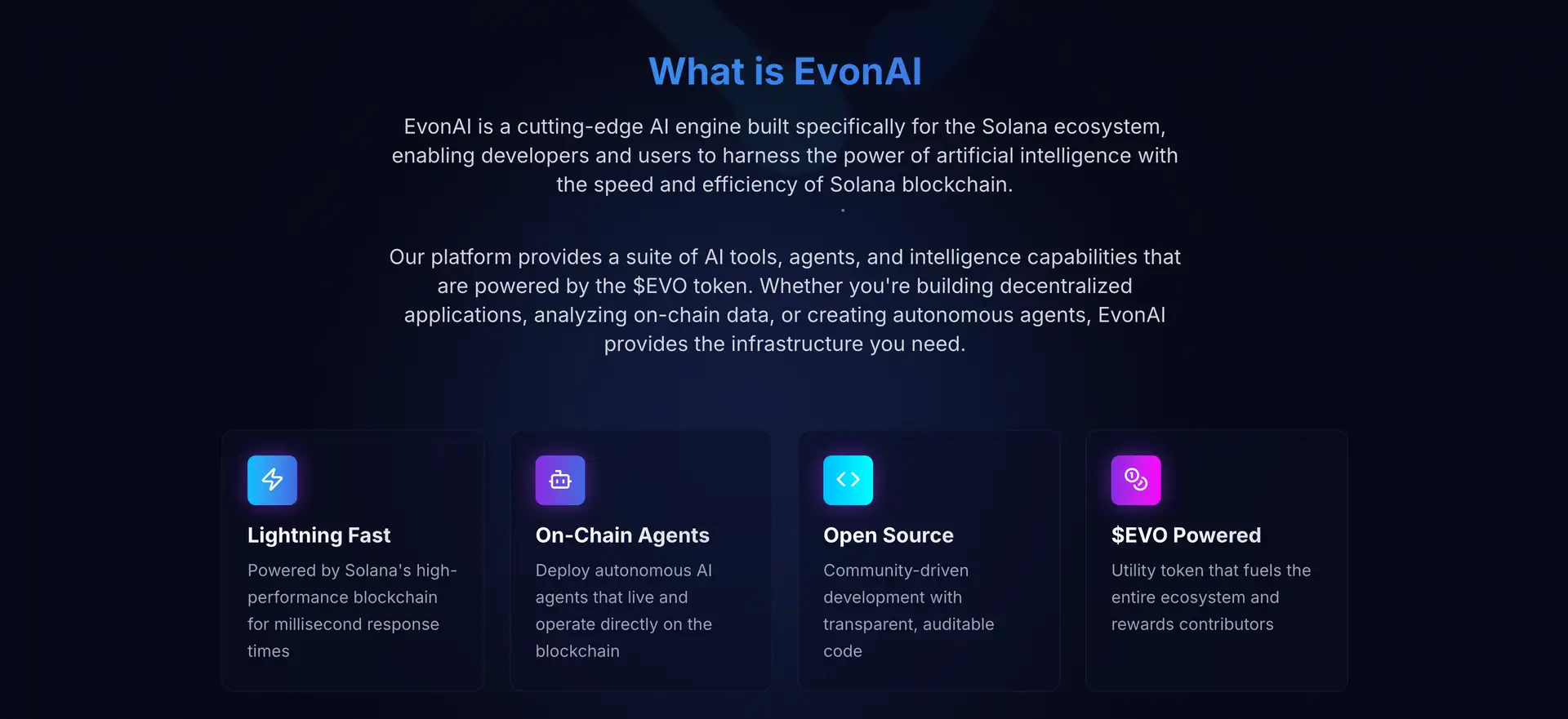About EvonAI
EvonAI is a decentralized artificial intelligence infrastructure project purpose-built for the Solana blockchain. It empowers developers, traders, and decentralized organizations to deploy smart, autonomous agents capable of operating directly on-chain with sub-second performance. The project's vision is to bridge the rapidly expanding AI market with the speed and scalability of Web3, delivering real-time AI tools and infrastructure to a broader community.
By leveraging EvonAI's powerful infrastructure, users can access AI-driven services in DeFi, NFTs, and on-chain data analytics while maintaining full transparency and decentralization. Through a combination of open-source tooling, community governance, and innovative AI-agent deployment, EvonAI is redefining how intelligent systems interact with blockchain ecosystems.
EvonAI was created to address the growing need for fast, intelligent, and decentralized AI systems in blockchain ecosystems. As the AI industry approaches a projected $207 billion in market value by 2025, and as decentralized finance (DeFi) continues its exponential rise, EvonAI combines these two powerful forces on the Solana blockchain—one of the fastest and most cost-efficient blockchain networks in the industry.
At the core of the project is the ability to deploy autonomous AI agents directly onto the blockchain. These agents are capable of real-time data processing, decentralized governance, generative NFT creation, trading strategy automation, and on-chain analytics. This architecture leverages Solana's high-speed validator network and cross-program invocations to enable fast, low-cost AI execution. The AI Processing Layer includes a custom inference engine, decentralized model registry, and optimized compute framework, offering a next-gen infrastructure for AI applications on-chain.
Key components include developer SDKs, APIs, and one-click deployment tools that streamline the creation of AI-powered decentralized applications (dApps). A robust set of governance mechanisms allows token holders to vote on upgrades, allocate ecosystem funds, and control platform direction through decentralized decision-making. Staking functionality, a growing agent marketplace, and liquidity incentives further contribute to a vibrant and evolving ecosystem.
The competitive landscape for EvonAI includes other AI-focused Web3 platforms like Fetch.ai, Numerai, and Ocean Protocol. However, unlike these Ethereum-based solutions, EvonAI operates on Solana, offering 99% lower fees and sub-second execution speeds. This unique Solana-native architecture allows EvonAI to stand out by providing highly responsive AI tools that integrate seamlessly into existing Solana DeFi protocols, NFTs, and DAO governance frameworks.
EvonAI offers a wide range of features and advantages that make it a leading solution for AI integration on the blockchain:
- Solana-Native Speed: Built for the Solana blockchain, enabling sub-second execution and millisecond response times for AI operations.
- On-Chain Autonomous Agents: Deploy smart agents directly onto the blockchain to operate without centralized oversight.
- Developer-Friendly Toolkits: SDKs, APIs, and a simulation framework make development seamless for both beginners and professionals.
- Advanced AI Capabilities: Real-time DeFi analytics, trading automation, and generative NFT tools built with custom AI models.
- Governance & Incentives: Token-based governance, staking rewards, and discounted platform fees for $EVO holders.
- Open-Source Development: Fully auditable and transparent code available via GitHub for community collaboration.
EvonAI provides a streamlined onboarding process for users and developers looking to engage with its powerful AI infrastructure:
- Visit the Official Website: Head to the EvonAI homepage to explore its features and launch the dApp.
- Connect a Solana Wallet: Use popular wallets like Phantom or Solflare to connect to the platform securely.
- Explore AI Tools: Access available AI agents, trading assistants, NFT generators, and analytics dashboards within the app.
- Deploy Agents: Use the platform's development tools and UI to launch your own custom AI agents on-chain.
- Stake $EVO Tokens: Participate in staking pools to earn rewards and gain governance rights.
- Join the Community: Follow EvonAI on social media and GitHub for updates, announcements, and collaboration opportunities.
EvonAI Reviews by Real Users
EvonAI FAQ
EvonAI enables users to deploy on-chain AI agents that live and operate directly on the Solana blockchain. Unlike off-chain bots, which rely on centralized servers and API calls, these agents are entirely autonomous, decentralized, and execute logic through smart contracts. This means zero downtime, no reliance on third-party infrastructure, and direct integration with other Solana-based dApps.
Yes, EvonAI includes a built-in toolkit for generative NFT creation powered by advanced AI models. Artists and developers can design, train, and deploy AI-driven NFT collections entirely on-chain, combining creative generation with automated minting and smart contract deployment. This opens the door to fully automated and scalable digital art projects.
EvonAI was engineered to leverage the high-speed, low-cost infrastructure of the Solana blockchain. Solana’s ability to process transactions in milliseconds allows EvonAI’s AI computations to run in real time, a critical requirement for on-chain trading bots, data analytics, and decentralized governance systems. This gives EvonAI a substantial edge over Ethereum-based AI protocols.
Through its AI-powered Data Analysis Engine, EvonAI allows developers to ingest and interpret large amounts of on-chain financial data with minimal latency. Using the developer SDK and API suite, users can create dashboards, predictive models, and real-time alerts tailored to specific DeFi market conditions. This is ideal for automated trading, yield optimization, and protocol health monitoring.
EvonAI offers advanced governance bots that help DAOs manage proposals, execute on-chain votes, and distribute rewards autonomously. These agents can monitor smart contracts, verify quorum requirements, and even notify token holders—all without manual intervention. This makes decentralized governance not only more efficient but also more secure and scalable, especially for large, multi-stakeholder ecosystems.
You Might Also Like












